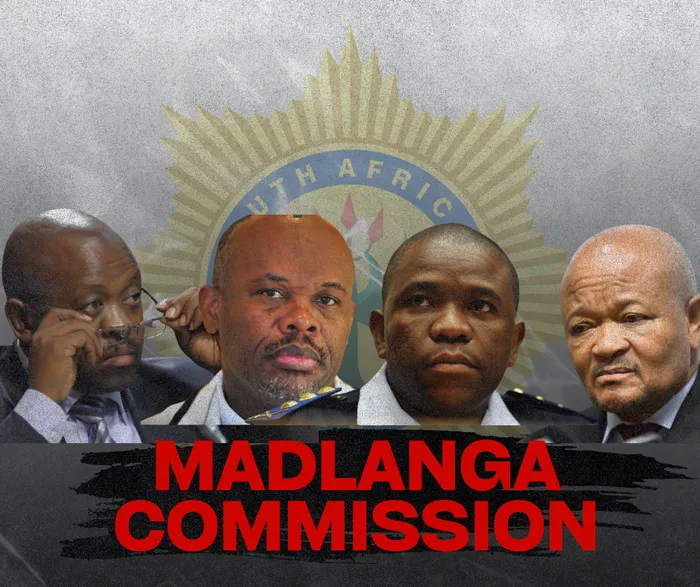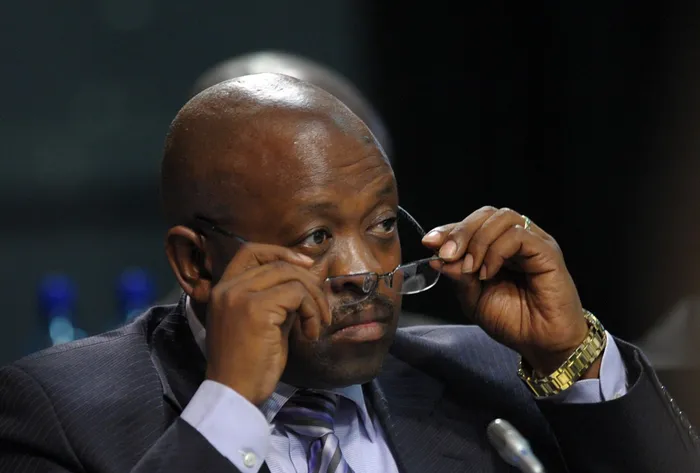R147.9m to uncover SAPS rot: Mkhwanazi takes on Mchunu and Sibiya as Madlanga Commission kicks off this week

In the spotlight: Justice Madlanga, Police Minister Senzo Mchunu, Deputy Commissioner Shadrack Sibiya and KZN Commissioner Nhlanhla Mkhwanazi — as the R147.9m Madlanga Commission into SAPS corruption kicks off this week
Image: IOL Graphics

Experts and political parties say the postponement of the Commission of Inquiry into criminality and corruption within the law enforcement, chaired by judge Mbuyiseli Madlanga, could lead to evidence being destroyed.
Image: Dumisani Sibeko/Independent Newspapers
As South Africa braces for the Madlanga Commission, taxpayers are footing a R147.9 million bill for 2025 and 2026. The key question remains on whether the country will finally see value for money, or it will be just another expensive report gathering dust.
The Commission of Inquiry into criminality, political interference and corruption in the criminal justice system has been allocated R147.9 million.
However, questions have arisen over how the money will be spent, who will supply services, and whether past commissions have delivered any real value.
Concerns around the Commission’s budget have been raised by multiple political parties, with many doubting whether the outcomes will justify the cost.
The Madlanga Commission, prompted by allegations made by SAPS KwaZulu-Natal provincial police commissioner Lieutenant-General Nhlanhla Mkhwanazi, is set to begin public hearings onSeptember 17.
It failed to commence on September 1, after the Department of Justice and Constitutional Development failed to provide the necessary infrastructure and resources on time.
In response to queries by IOL News, Department of Justice and Constitutional Development spokesperson Terrence Manase said a funding request was submitted to the National Treasury on August 8, 2025, as part of the Adjustment Estimates of National Expenditure process.
He said the department is still waiting for the feedback.
“The Department has requested a total budget of R147.9 million for 2025/26,” Manase confirmed.
He added that R10.898 million has been allocated for compensation of employees.
“This covers remuneration for commissioners, evidence leaders, investigators, legal researchers and secretariat staff involved in the Commission.”
Under “good and services”, a total of R100.744 million has been allocated, with communication and ICT identified as the major cost driver, receiving R58.730 million.
This will cover all essential communication, connectivity and information technology needs for the Commission, including mobile devices, internet access, streaming services for hearings, searchable data storage solutions, cybersecurity, integrated email management, website development and other ICT services.
A further R11.157 million is budgeted for consultants under business and advisory services, primarily for the remuneration of investigators and legal researchers.
Legal services are set to receive R19.918 million for the remuneration of legal teams and counsel serving as evidence leaders.
Travel and subsistence will account for R2.678 million, covering travel costs for Commission staff and potential witnesses.
Capital assets have been allocated R36.258 million, of which R35.969 million will go towards machinery and equipment such as secure computers, servers, laptops and associated ICT infrastructure.
Asked by IOL News which service providers were appointed, the department did not disclose any details.
The Commission will be held at the Brigitte Mabandla Justice College, a state-owned facility, incurring no rental cost to the department.
President Cyril Ramaphosa previously said that the Commission’s reporting and oversight structures were clearly outlined upon its establishment.
“The Commission is expected to complete its work and submit a final report to the President. Interim reports are expected after three and six months, respectively,” he said.
The final report will also be submitted to the Speaker of the National Assembly and the Chief Justice.
Due to the sensitivity of the security arrangements, details of security costs will only be shared in the Commission’s final report, Manase added.
Meanwhile, civil society groups and opposition parties weighed in on the amount of money allocated for the commission.
Karam Singh, spokesperson for the anti-corruption organisation Corruption Watch, said the organisation will monitor how the money is spent.
“There are always concerns about money being wasted or mismanaged. But if we want to consider the cost-benefit, we need to look at the big picture,” Singh said.
“If the allegations are proven, or if more evidence emerges of how the police service is captured or corrupted by organised crime, the value to the country in revealing this - and in ensuring accountability for a better, less corrupt police service - could be immense.”
However, Singh expressed a concern that many commissions of inquiries in the country did not yield any positive results.
“Commissions of inquiry do not have a good track record when it comes to ultimate accountability and consequences for wrongdoing,” he said.
“Findings and recommendations are not binding and must be actioned by a political leadership willing to face the consequences.”
He added that Corruption Watch, along with civil society groups, would keep an eye on the Commission’s work to ensure it benefits the country.
Opposition parties have criticised the Commission’s high price tag and questioned whether it will deliver tangible results.
The uMkhonto weSizwe Party (MK Party) called the Commission a “political spectacle of judicial theatrics” and predicted it would yield little beyond a pile of non-binding recommendations.
“It will not lead to arrests. It will not root out criminality. It will not end the culture of impunity that has hollowed out our justice system,” said MK Party national spokesperson Nhlamulo Ndhlela.
“It is not a vehicle for justice, but a tool for political interference.”
ActionSA MP Dereleen James argued that existing law enforcement bodies, such as IPID, should be handling this kind of work.
“There is no logic in yet another commission of inquiry, especially when the R1 billion Zondo Commission report into state capture is gathering dust while those who committed treason continue to evade justice,” she said.
Build One South Africa (BOSA) spokesperson Rogers Solomons said the budget would only be justifiable if the Commission’s findings led to meaningful action.
“The challenge with commissions of inquiry is that the recommendations are not legally binding and end up on a desk somewhere in the Union Buildings collecting dust,” he told IOL News.
“The money is only worth spending if action and accountability follow.”
simon.majadibodu@iol.co.za
IOL Politics